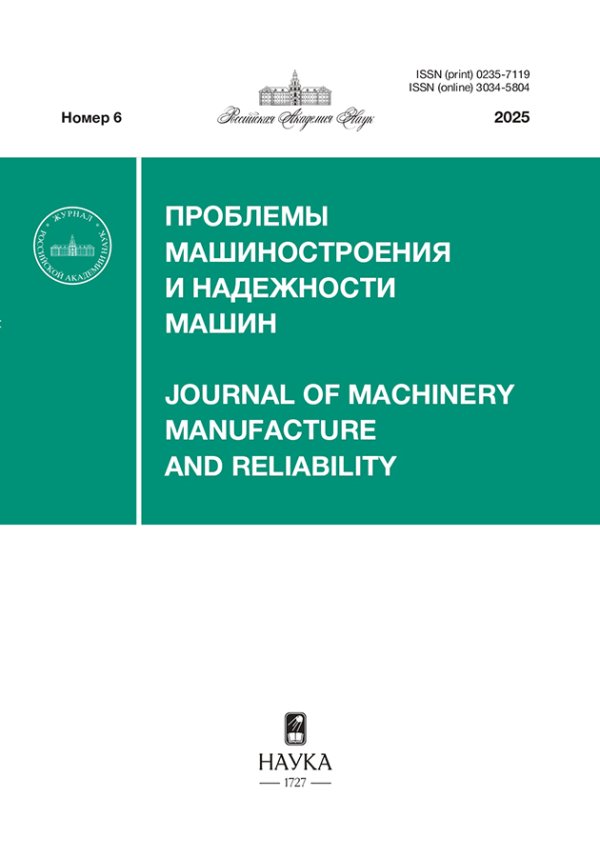№ 3 (2023)
МЕХАНИКА МАШИН
Кинематический и точностной анализ механизма параллельной структуры типа delta с использованием плюккеровых координат
Аннотация
В настоящей статье рассмотрен робот Delta, являющийся одним из наиболее известных представителей манипуляционных устройств параллельной структуры. Он включает в себя три кинематические цепи, каждая из которых содержит вращательный привод и шарнирный параллелограмм. Представлены решения задач кинематики, в том числе задачи о положениях и задачи точностного анализа. При решении используется винтовое исчисление. Показано, что близость к особым положениям обусловливает ухудшение повторяемости.
 3-16
3-16


Математическая модель движения сменного гусеничного модуля с податливой несущей рамой
Аннотация
В статье предложена математическая модель гусенично-модульного средства для машин тяжелого класса, в котором механическим демпфером подвески выступает топологически оптимизированная упругая рама устройства со сверхупругими упрочняющими элементами из композитного материала с термоупругими мартенситными превращениями. С помощью модели проводится оценка внутренних силовых факторов, возникающих в местах контакта опорных катков устройства и площадки опоры. Модель позволяет учитывать в процессе анализа влияние динамической нагрузки от инерции узлов и деталей механизма. Модель можно использовать для анализа влияния выхода из строя опорных катков гусеничной техники на перераспределение усилий между оставшимися исправными катками машины. По результатам симуляции нагружения устройства получены зависимости, позволяющие судить об уровне нагруженности опорных колес устройства в двух режимах работы, приведены рекомендации по дальнейшему уточнению модели.
 17-28
17-28


НАДЕЖНОСТЬ, ПРОЧНОСТЬ, ИЗНОСОСТОЙКОСТЬ МАШИН И КОНСТРУКЦИЙ
Температурные остаточные напряжения при лазерной иммерсионной резке металлов
Аннотация
Показаны преимущества использования лазерного сверления и резки при получении отверстий в металлах. Приведены расчетные данные температуры и температурных остаточных напряжений при лазерной и лазерной иммерсионной резке.
 29-32
29-32


Теоретические основы адаптированных зубчатых передач при работе в условиях перекоса
Аннотация
В статье исследуется так называемая зубчатая передача с адаптированными свойствами. Такие передачи используются для повышения нагрузочной способности зубчатых зацеплений путем уменьшения максимальных контактных напряжений с помощью увеличения контактной податливости зубьев, работающих в условиях перекоса. Предложен подход, и на его основе задача решена аналитически, получены формулы для определения максимальных контактных напряжений зубьев зубчатых колес с кольцевыми канавками. Сделана оценка снижения контактных напряжений у зубьев, с адаптированными свойствами при перекосе, по сравнению с обычными зубьями.
 33-39
33-39


Оценка эксплуатационной надежности шестеренных гидронасосов, отремонтированных с применением метода электроискровой обработки
Аннотация
Статья посвящена оценке эффективности новой технологии ремонта шестеренных насосов с восстановлением изношенных поверхностей ресурсоопределяющих сопряжений деталей и повышением их износостойкости. Отремонтированные по предложенной технологии гидронасосы показали увеличение среднего межремонтного ресурса в условиях реальной эксплуатации в 1.07 раза по сравнению с ресурсом в доремонтный период эксплуатации.
 40-47
40-47


Двухслойная балка в условиях ползучести и роста поврежденности при трехточечном нагружении
Аннотация
Проблема замедленного разрушения и длительной прочности многослойных композитов представляет не только фундаментальный, но и прикладной интерес. Предложенное решение позволяет оценить влияние геометрии, структуры и соотношения свойств слоистого композита на его долговечность. Время до разрушения двухслойной металлической балки прямоугольного сечения определяется в зависимости от отношения толщин слоев и их модулей Юнга.
 48-57
48-57


Влияние термической обработки на структуру сварного соединения сплава ВЖ178П после ротационной сварки трением
Аннотация
В настоящей статье приведены структурные металлографические исследования жаропрочного сплава на основе никеля марки ВЖ178П после ротационной сварки трением на уникальной установке российского производства ПСТИ-400. В ходе проведенного исследования проанализировано воздействие отдельно взятых параметров режимов сварки по отдельности и в совокупности, как на микроструктуру сварного соединения, околошовной зоны и основного материала, так и на показатели микротвердости по Виккерсу в этих областях. После подготовки, сварки и вырезки образцов проведена термическая обработка, результаты которой представлены в настоящей статье соответственно.
 58-63
58-63


Моделирование влияния наноразмерных наполнителей на механические свойства и износостойкость композита на основе полиэфирэфиркетона
Аннотация
Применен метод молекулярно-динамического моделирования для создания моделей полиэфирэфиркетона и двух его нанокомпозитов, с наполнителями в виде наночастиц меди и с фуллереном. Приведены результаты сравнительных исследований деформационно-прочностных свойств этих материалов посредством моделирования одноосного растяжения при постоянной скорости деформации. Получено, что при наполнении полиэфирэфиркетона фуллереном значение упругости композита снижается приблизительно в 2 раза, а в случае наполнения этой же матрицы наночастицами меди ее величина повышается приблизительно на 30%. При этом средняя величина энергии межмолекулярных связей композита с наночастицами меди в 2.65 раза превышает энергию межмолекулярных связей композита с фуллереном.
 64-69
64-69


НОВЫЕ ТЕХНОЛОГИИ В МАШИНОСТРОЕНИИ
Разработка новых инструментов для эндоскопических хирургических операций
Аннотация
В статье рассмотрены новые устройства и инструменты для малоинвазивной эндоскопической хирургии, разработанные Институтом машиноведения им. А.А. Благонравова РАН совместно с Центральной клинической больницей Российской академии наук. Представлены экспериментальные образцы устройств и инструментов.
 70-77
70-77


АВТОМАТИЗАЦИЯ И УПРАВЛЕНИЕ В МАШИНОСТРОЕНИИ
Структурная адаптация программы контроля безопасности технического состояния сложной технической системы
Аннотация
Представленные в статье подходы к разработке, оценке эффективности и целесообразности проведения контроля, постановки задач и их математические модели позволяют решить проблему синтеза адаптивных программ контроля безопасности технического состояния сложной технической системы.
 78-88
78-88


Обоснование и результаты численного моделирования струйного маслоснабжения сопряжения “цилиндр–поршень” в быстроходном четырехтактном двигателе внутреннего сгорания
Аннотация
В статье дано научное обоснование метода расчета и моделирования одного из малоизученных аспектов маслоснабжения, а именно: струйной подачи моторного масла из зазоров вращающегося шатунного подшипника коленчатого вала в сопряжение “цилиндр–поршень” быстроходного четырехтактного дизеля универсального назначения. Результатом моделирования явились представленные в настоящей статье визуализация траектории и зон попадания масла на поверхности трения деталей цилиндропоршневой группы, а также количественная оценка объемов масла в этих зонах и пространстве картера. Метод моделирования и результаты его применения могут представлять как научный, так и практический интерес для специалистов в области проектирования систем смазки и обеспечения надежности поршневых машин.
 89-99
89-99


ЭКСПЕРИМЕНТАЛЬНАЯ МЕХАНИКА. ДИАГНОСТИКА ИСПЫТАНИЯ
Методика испытания трибологических свойств осевых опор
Аннотация
В статье приведены и рассмотрены методические испытания трибологических свойств осевых опор. В качестве опоры была выбрана гидрозащита с усиленной осевой опорой для высокооборотных лопастных насосов. В качестве экспериментального образца использовались сегментный подпятник и пята. В процессе эксперимента были получены основные характеристики работоспособности экспериментального образца.
 100-105
100-105


Формообразование гибридных заготовок из алюминиевых сплавов осадкой с кручением
Аннотация
Рассмотрена возможность получения гибридных заготовок из алюминиевых сплавов АМг2, АМг5 и АМг6 методом комбинированной деформации осадкой в сочетании с поверхностным сдвигом (осадка с кручением). Применен метод конечноэлементного моделирования процесса формообразования с применением программы QForm 10.1.5. Полученные реологические модели деформируемых материалов и использование специально разработанной подпрограммы “friction.sliding_velocity” позволили получить результаты моделирования, хорошо согласующиеся с экспериментальными данными. Металлографические исследования подтвердили высокое качество соединения заготовок в зоне контакта.
 106-112
106-112












